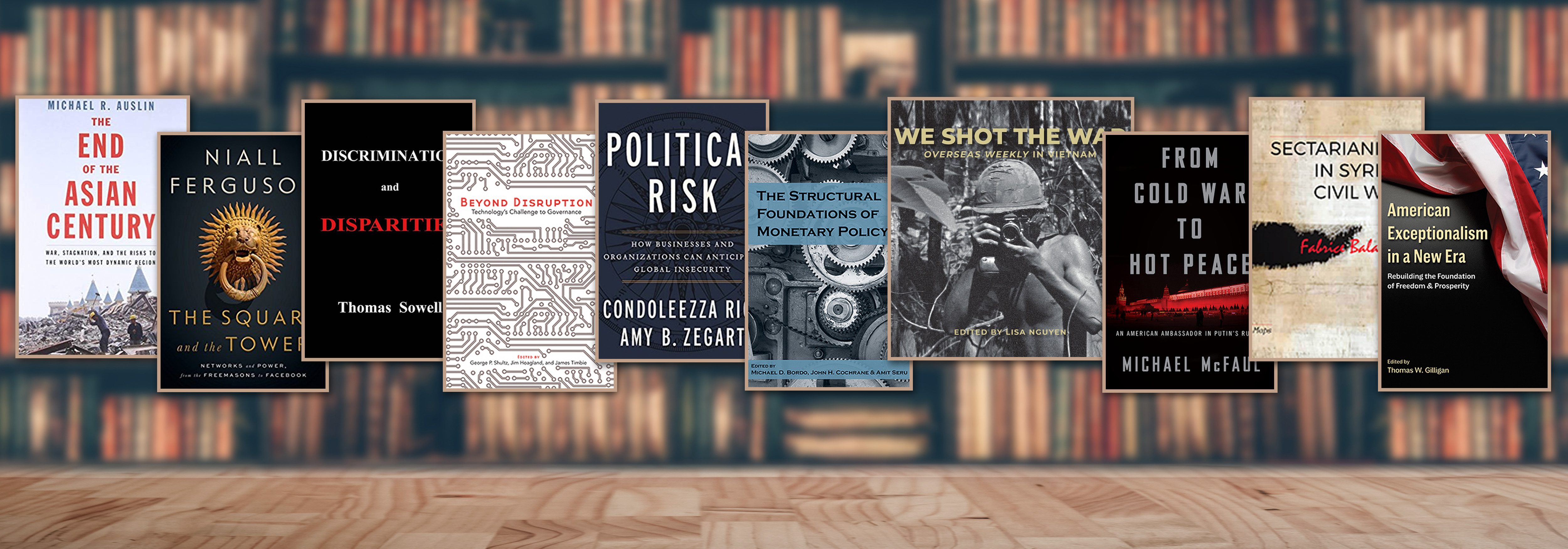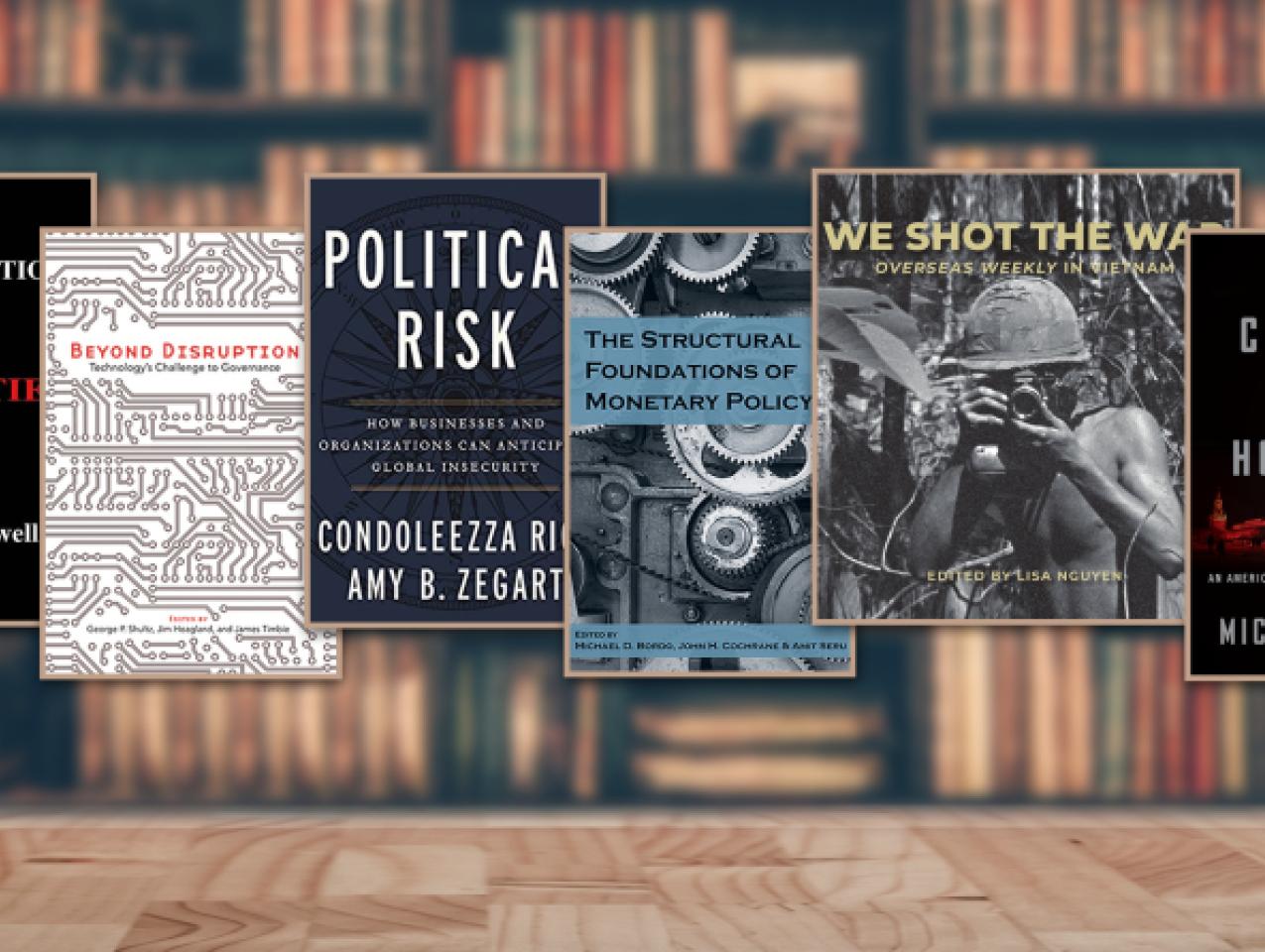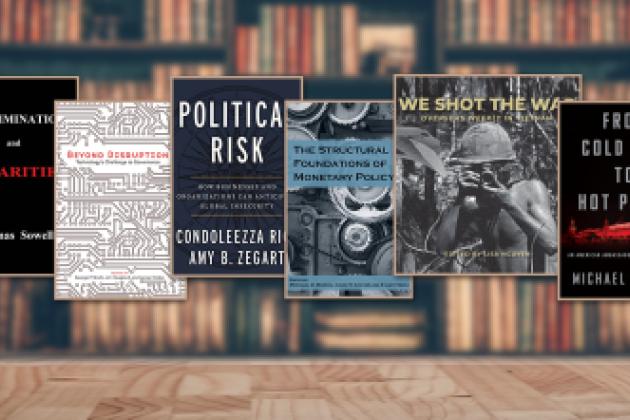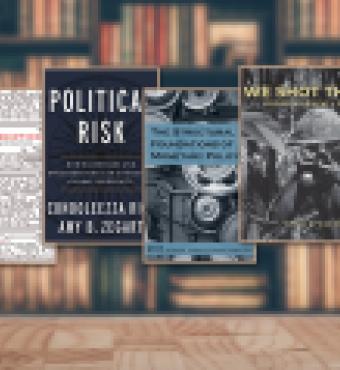
The depth of Hoover’s scholarship is reflected in the numerous books published by our fellows on a broad variety of topics and issues. This timely and prodigious output offers insight on the most pressing issues in public policy. The books they published this year range in topics from networks to the global insecurity to American exceptionalism.
Check out this selection of books published by Hoover scholars in 2018:
Discrimination and Disparities
By Thomas Sowell
Economic and other outcomes differ vastly among individuals, groups, and nations. Many explanations have been offered for the differences. Some believe that those with less fortunate outcomes are victims of genetics. Others believe that those who are less fortunate are victims of the more fortunate.
The Square and the Tower
By Niall Ferguson
Most history is hierarchical: it's about emperors, presidents, prime ministers and field marshals. It's about states, armies and corporations. It's about orders from on high. Even history "from below" is often about trade unions and workers' parties. But what if that's simply because hierarchical institutions create the archives that historians rely on? What if we are missing the informal, less well documented social networks that are the true sources of power and drivers of change?
Political Risk: How Businesses and Organizations Can Anticipate Global Insecurity
By Condoleezza Rice, Amy Zegart
The world is changing fast. Political risk—the probability that a political action could significantly impact a company's business—is affecting more businesses in more ways than ever before. A generation ago, political risk mostly involved a handful of industries dealing with governments in a few frontier markets. Today, political risk stems from a widening array of actors, including Twitter users, local officials, activists, terrorists, hackers, and more.
From Cold War to Hot Peace
By Michael McFaul
From one of America’s leading scholars of Russia, who served as US ambassador to Russia during the Obama administration, this is a revelatory, inside account of US-Russia relations from 1989 to the present.
Beyond Disruption: Technology's Challenge to Governance
By George P. Shultz, Jim Hoagland, James Timbie
In Beyond Disruption: Technology’s Challenge to Governance, George P. Shultz, Jim Hoagland, and James Timbie present views from some of the country's top experts in the sciences, humanities, and military that scrutinize the rise of post-millennium technologies in today’s global society.
We Shot the War: Overseas Weekly in Vietnam
Edited by Lisa Nguyen
Intended as a counterpoint to the US Department of Defense–sanctioned press such as Stars and Stripes, Overseas Weekly (OW) was first published in 1950 by enterprising Stanford University graduates Cecil and Marion von Rospach. We Shot the War: Overseas Weekly in Vietnam, edited by Lisa Nguyen, unearths the important role of this publication in one of the most controversial periods of American history.
The Structural Foundations of Monetary Policy
Edited by Michael D. Bordo, John H. Cochrane, Amit Seru
In The Structural Foundations of Monetary Policy, Michael D. Bordo, John H. Cochrane, and Amit Seru bring together discussions and presentations from the Hoover Institution’s annual monetary policy conference. The conference participants discuss long-term monetary issues facing the world economy, with an emphasis on deep, unresolved structural questions. They explore vital issues affecting the Federal Reserve, the US central bank. They voice concern over the Fed’s independence, governance, and ability to withstand future shocks and analyze the effects of its monetary policies and growing balance sheet in the wake of the 2008 financial crisis.
American Exceptionalism in a New Era
Edited by Thomas W. Gilligan
In American Exceptionalism in a New Era, editor Thomas W. Gilligan, director of the Hoover Institution, has compiled thirteen essays by Hoover fellows that discuss the unique factors that have historically set America apart from other nations and show how America and its people have prospered and emerged as global leaders by prizing individuality and economic freedom. Essays explore key factors in America’s success, including immigration, education, divided government, light regulation, low taxes, and social mobility. America isn’t perfect, these authors argue, but it is exceptional.
The End of the Asian Century
By Michael Auslin
Since Marco Polo, the West has waited for the “Asian Century.” Today, the world believes that century has arrived. Yet from China’s slumping economy to war clouds over the South China Sea, and from environmental devastation to demographic crisis, Asia’s future is increasingly uncertain. Historian and geopolitical expert Michael Auslin argues that far from being a cohesive powerhouse, Asia is a fractured region threatened by stagnation and instability.
Sectarianism in Syria's Civil War
By Fabrice Balanche
Syria's sectarian fragmentation was not created when the war began in 2011; it had its genesis in an inherited Ottoman millet system whose traits were accentuated by the "divide to reign" policies of Hafiz al-Assad. The war has compelled Syrians to cling to their sectarian identities more tightly, whether out of socioeconomic self-interest or simply to survive. Examining these identities is therefore crucial to answering the most fundamental questions about the ongoing upheaval. In many ways, the Syrian conflict has been taken out of the hands of Syrians themselves, becoming a proxy war between regional and international forces that often exploit the country's divided society for their own benefit. This geopolitical study, illustrated with seventy original maps and graphics, is intended to foster a deeper understanding of the role that sectarianism has played in Syria's war.





















